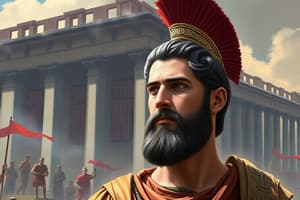Podcast
Questions and Answers
Which character is most driven by envy and a desire to halt Caesar's increasing authority?
Which character is most driven by envy and a desire to halt Caesar's increasing authority?
- Caius Cassius (correct)
- Casca
- Marcus Brutus
- Mark Antony
What internal conflict does Marcus Brutus grapple with throughout the play?
What internal conflict does Marcus Brutus grapple with throughout the play?
- His ambition for power versus his desire for a simple life
- His love for Calpurnia versus his duty to the Senate
- His loyalty to Caesar versus his concern for the Roman Republic (correct)
- His friendship with Cassius versus his respect for Antony
How does the play Julius Caesar explore the theme of the corrupting influence of power?
How does the play Julius Caesar explore the theme of the corrupting influence of power?
- By suggesting that power is only dangerous in the hands of the common people.
- By illustrating how power promotes unity and stability in Rome.
- By showing how power strengthens moral character.
- By demonstrating how the pursuit of power leads to ethical compromises and abuses. (correct)
What is the significance of the Soothsayer's warning to Caesar to 'beware the Ides of March'?
What is the significance of the Soothsayer's warning to Caesar to 'beware the Ides of March'?
How does Cassius manipulate Brutus to join the conspiracy against Caesar?
How does Cassius manipulate Brutus to join the conspiracy against Caesar?
What political ideology clashes with the potential rise of an empire under Caesar's rule?
What political ideology clashes with the potential rise of an empire under Caesar's rule?
What do images of blood and sacrifice primarily symbolize within the play?
What do images of blood and sacrifice primarily symbolize within the play?
How are characters sometimes portrayed through animal imagery in the play?
How are characters sometimes portrayed through animal imagery in the play?
What is the primary purpose of rhetorical devices used by characters like Antony and Cassius?
What is the primary purpose of rhetorical devices used by characters like Antony and Cassius?
How do the unusual omens and strange occurrences contribute to the atmosphere of the play?
How do the unusual omens and strange occurrences contribute to the atmosphere of the play?
What does the recurring theme of 'public versus private good' emphasize in Brutus's character?
What does the recurring theme of 'public versus private good' emphasize in Brutus's character?
What is the significance of Calpurnia's dreams in Act II?
What is the significance of Calpurnia's dreams in Act II?
How does the play portray the Roman Senate?
How does the play portray the Roman Senate?
Which of the following best describes the justification used by the conspirators for assassinating Caesar?
Which of the following best describes the justification used by the conspirators for assassinating Caesar?
Which character is known for their loyalty and support of Caesar?
Which character is known for their loyalty and support of Caesar?
What is the main concern that fuels the conspiracy against Caesar?
What is the main concern that fuels the conspiracy against Caesar?
Which character trait most defines Brutus's actions in the play?
Which character trait most defines Brutus's actions in the play?
What overarching question does the play Julius Caesar raise about leadership?
What overarching question does the play Julius Caesar raise about leadership?
Which of the following contributes most to the sense of political instability in Rome?
Which of the following contributes most to the sense of political instability in Rome?
What recurring metaphor is used to describe the potential dangers of Caesar's ambition?
What recurring metaphor is used to describe the potential dangers of Caesar's ambition?
Flashcards
Julius Caesar
Julius Caesar
Roman general and statesman, portrays ambition and confidence, revered by the people.
Marcus Brutus
Marcus Brutus
A noble Roman, known for integrity, friend of Caesar, conflicted about the Republic.
Caius Cassius
Caius Cassius
Envious Roman senator, opposes Caesar, instigator of the conspiracy.
Mark Antony
Mark Antony
Signup and view all the flashcards
Casca
Casca
Signup and view all the flashcards
Calpurnia
Calpurnia
Signup and view all the flashcards
Soothsayer
Soothsayer
Signup and view all the flashcards
Dangers of ambition
Dangers of ambition
Signup and view all the flashcards
Corrupting influence of power
Corrupting influence of power
Signup and view all the flashcards
Republicanism versus Imperialism
Republicanism versus Imperialism
Signup and view all the flashcards
Conspiracy and betrayal
Conspiracy and betrayal
Signup and view all the flashcards
Public opinion and manipulation
Public opinion and manipulation
Signup and view all the flashcards
The role of the Senate
The role of the Senate
Signup and view all the flashcards
The justification of political violence
The justification of political violence
Signup and view all the flashcards
The Soothsayer's warning
The Soothsayer's warning
Signup and view all the flashcards
Calpurnia's dreams
Calpurnia's dreams
Signup and view all the flashcards
Unusual omens
Unusual omens
Signup and view all the flashcards
Cassius's manipulation of Brutus
Cassius's manipulation of Brutus
Signup and view all the flashcards
Storms and omens
Storms and omens
Signup and view all the flashcards
Blood and sacrifice
Blood and sacrifice
Signup and view all the flashcards
Study Notes
Character Introductions
- Julius Caesar: A celebrated Roman general and statesman, returning to Rome after a military victory. He is portrayed as ambitious, confident, and revered by the populace.
- Marcus Brutus: A noble and respected Roman, known for his integrity and honor. He is Caesar's friend but is conflicted by his concern for the Roman Republic.
- Caius Cassius: A shrewd and envious Roman senator who opposes Caesar's growing power. He is the main instigator of the conspiracy against Caesar.
- Mark Antony: A loyal friend and supporter of Caesar, known for his charisma and oratory skills.
- Casca: A cynical and sarcastic Roman senator who joins the conspiracy.
- Calpurnia: Caesar's wife, plagued by ominous dreams and fears for her husband's safety.
- Soothsayer: A mysterious figure who warns Caesar to "beware the Ides of March."
Themes of Power
- The dangers of ambition: Caesar's ambition is a central theme, explored through the concerns of the conspirators who fear his potential tyranny.
- The corrupting influence of power: The play examines how power can corrupt individuals and lead to abuse.
- The nature of leadership: The qualities of a good leader are questioned, contrasting Caesar's ambition with Brutus's sense of duty and honor.
- Public versus private good: The conflict between personal loyalty and the perceived needs of the state is a recurring theme, particularly in Brutus's internal struggle.
- Manipulation and persuasion: Characters use rhetoric and influence to sway public opinion and advance their own agendas.
Foreshadowing Events
- The Soothsayer's warning: His warning to "beware the Ides of March" foreshadows Caesar's assassination.
- Calpurnia's dreams: Her nightmares of Caesar's statue spouting blood and Romans washing their hands in it foreshadow his death and the ensuing chaos.
- Unusual omens: Strange occurrences such as storms, lions in the streets, and men on fire are interpreted as portents of impending doom.
- Cassius's manipulation of Brutus: Cassius plants forged letters to manipulate Brutus into believing that the Roman people fear Caesar's ambition, foreshadowing Brutus's involvement in the conspiracy.
Political Conflict
- Republicanism versus Imperialism: The play explores the tension between the ideals of the Roman Republic and the potential rise of an empire under Caesar's rule.
- Conspiracy and betrayal: The senators plot to assassinate Caesar, driven by their fear of his growing power.
- Public opinion and manipulation: The characters attempt to sway the Roman populace through speeches, rumors, and staged events.
- The role of the Senate: The play depicts the Roman Senate as a center of political intrigue and power struggles.
- The justification of political violence: The conspirators debate the morality of assassinating Caesar for the sake of the Republic.
Imagery and Language
- Storms and omens: Storms and other natural disturbances are used to create a sense of unease and foreshadow impending events.
- Blood and sacrifice: Images of blood and sacrifice are used to symbolize violence, death, and the consequences of political actions.
- Disease and sickness: Metaphors of disease and sickness are used to describe the state of Rome and the threat posed by Caesar's ambition.
- Animal imagery: Characters are compared to animals to highlight their traits and motivations (e.g., Caesar as a lion, Cassius as a wolf).
- Rhetorical devices: Characters use rhetorical devices such as metaphors, similes, and rhetorical questions to persuade and manipulate others.
Studying That Suits You
Use AI to generate personalized quizzes and flashcards to suit your learning preferences.




